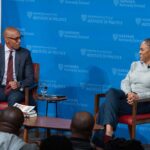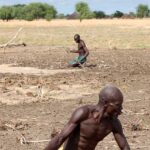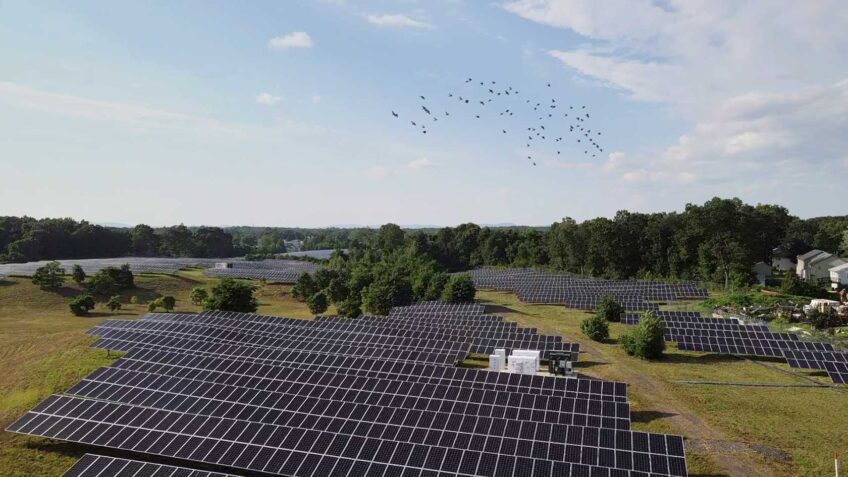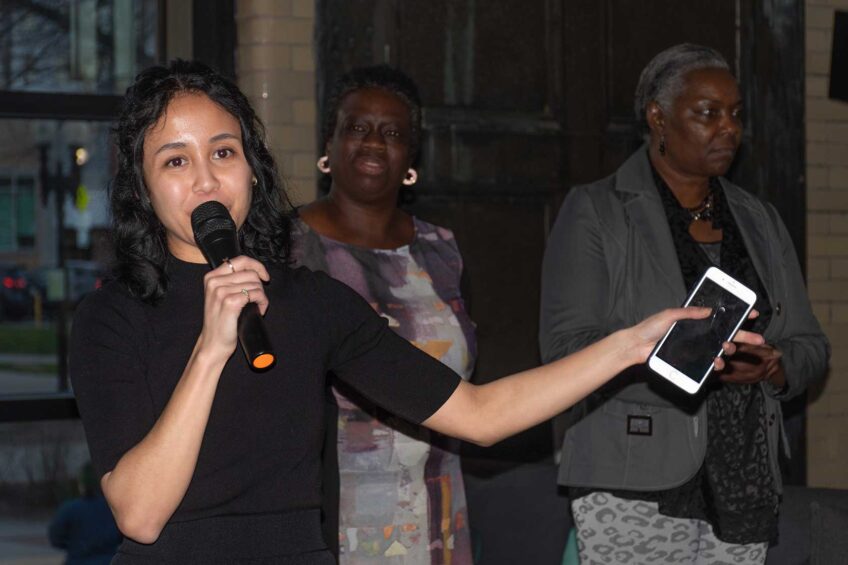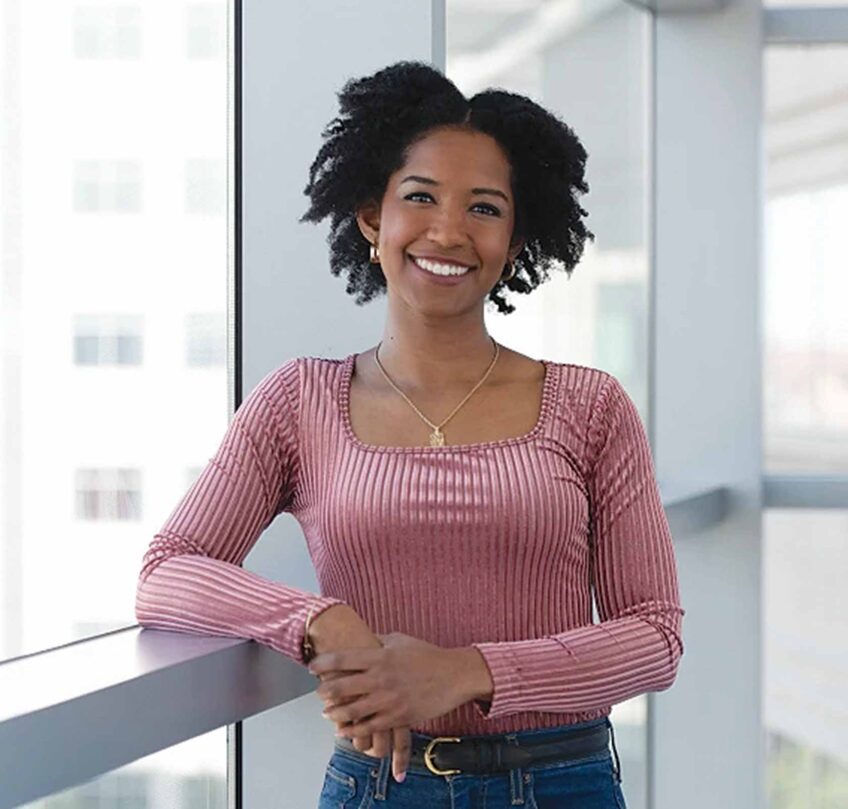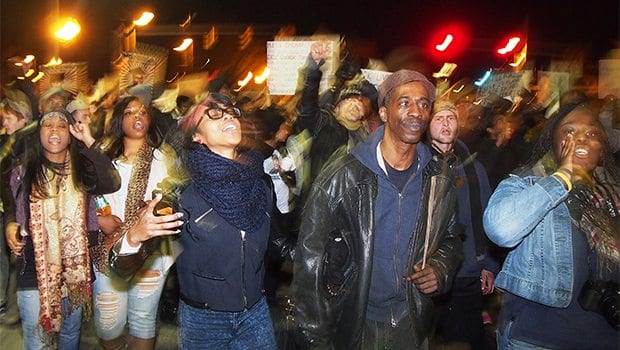

Demonstrators march down Harrison Avenue as part of a wave of protests following a Missouri grand jury’s decision not to indict a white police officer who shot unarmed teen Michael Brown dead in August.
In Boston and in cities across the United States demonstrators took to the streets to protest police violence against blacks.
The protests were sparked by a grand jury decision not to indict police officer Darren Wilson in the shooting of unarmed 18-year-old Ferguson, Missouri resident Michael Brown, ranged from rioting in Missouri to non-violent sit down demonstrations in shopping malls.
Boston protesters rallied in Dudley Square last Tuesday in front of the Area B2 police station before marching to the South Bay House of Correction, blocking the on ramp to Interstate 93, then marched along Massachusetts Avenue to Copley Square.
The phrase “black lives matter” was a rallying cry in Boston as in other cities adorning signs and shouted as a rallying cry as the marchers made their way through the city.
Passing through the crowd gathered at the South Bay jail, Suffolk County Sheriff Steve Tompkins expressed support for the protest.
“It’s one heck of a display of civic engagement,” he said. “As long as it remains peaceful, I certainly do not have a problem with it. We can’t live in a country where young men of color are killed indiscriminately. These types of incidents have to stop.”
Brown’s Aug. 9 shooting hit a raw nerve in Ferguson and across the country, putting police shootings under a spotlight. Protests were held in cities around the world. And news reports of police shootings since then have circulated widely on social media. The latest police shooting to make national news was that of Tamir Rice, a 12-year-old who was shot dead by police in a Cleveland playground while holding a BB gun.
An analysis released in October by the ProPublica news organization found that blacks aged 15 to 19 were more than 20 times more likely to be shot dead by police than whites in the same age range.

Demonstrators in Dudley gathered across from the Area B2 police station before marching to the South Bay jail, then down Massachusetts Avenue.
The heightened awareness of the disparate impacts of police shootings was not lost on Boston last week when Mayor Martin Walsh
joined black elected officials and clergy at the 12th Baptist Church as community residents took to an open microphone to talk about police relations with the black community.
“I’m not going to pretend that everything is okay in the city of Boston or that the legacy of injustice can be healed overnight,” he said. “I’m here to listen tonight.”
Also present was Governor-elect Charlie Baker, who spoke about DJ Henry, the son of a family friend who was gunned down by police in upstate New York.
While community members spoke inside the church, hundreds gathered across from the B2 station were giving voice to their rage at what many said was a history of black lives being undervalued in the United States.
Protest organizers set up an open microphone and loudspeaker on the back of a pickup truck, giving a steady stream of demonstrators a chance to air their views.
“Why aren’t we in the street?” one speaker implored. “Why aren’t we shutting down the MBTA?”
Standing in the thick of the Dudley crowd, UMass Boston Professor Tony Van Der Meer said the “black lives matter” slogan struck a chord with many.

Community members, clergy, city and state officials gathered at the 12th Baptist Church pray for peace during a Tuesday meeting.
“Our lives didn’t matter in the Supreme Court’s decision with Dred Scott more than 100 years ago and they don’t matter to the grand jury,” he said. “The truth of the matter is the young people should be angry. We have to support them.”
While police estimated the crowd at 1,500, event organizers estimated the turnout at 4,000. En route to South Bay, the marchers spread out for nearly a quarter mile as they headed down Harrison Avenue before turning onto Melnea Cass Boulevard. Throughout much of the march, police showed restraint, blocking traffic for marchers as they made their way toward the Interstate 93 on-ramp.
When the marchers reached the South Bay jail, police officers formed a line to block any advance toward the highway. It was at this line where police made the initial arrests. For a few minutes before 9:30 p.m., protesters tried to push through the police line. Then police began pushing back, making arrests as they advanced on the protesters.
Protesters who were arrested complained of being punched, kicked and slammed to the ground by arresting officers. Many, including the son of a Boston police officer, appeared the following day at arraignment with bruises and blackened eyes.
On Friday, many of the same protesters were back, marching down Newbury Street to urge a boycott of the Black Friday shopping day. On Monday, protesters in Harvard Square stopped traffic on Massachusetts Avenue with a “die-in” demonstration, where demonstrators lay down in the street.

Beantown Society Director Kendra Rosalie Lara Paredes speaks at the 12th Baptist Church with students Josmar Torres and Kamina Nixon.
Similar marches and protests from San Francisco to New York generated headlines and captivated the nation, at least for several days. The more important part of the protest is what comes after, according to NAACP Boston Branch President Michael Curry.
“What I hope comes out of this is a sense of common purpose around longstanding issues with regard to law enforcement,” he said.
Curry noted that legislation requiring police departments in Massachusetts to collect and share data on the race of people questioned and/or detained by officers has been stuck in the Legislature. Curry also said civil right activists should press for body-worn cameras, greater diversity in police departments and better diversity training for police.
“There should not be a police officer in Boston who does not understand race and racism,” he said.
Last week’s demonstration will only be meaningful if it translates into action, Curry said.
“The march was great for consciousness raising, like the Million Man March, but it has to translate into attendance at City Council and State House hearings, otherwise we’ll be out there marching again,” he commented.

![Banner [Virtual] Art Gallery](https://baystatebanner.com/wp-content/uploads/2024/05/Breathe-Life-4-ToGetHe_WM-150x150.jpg)
